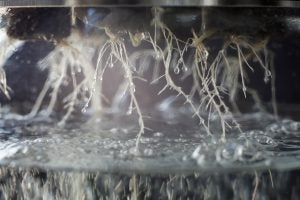I just hit a milestone: my 30th anniversary as a lettuce grower [raucous applause?]. First as a young tyke at the family farm, and later in the wondrous, climate controlled college greenhouse. The latter was hydroponic, far removed from my conventional rearing. Fortunately, the experience I had amassed in the field was easily “convertible” into hydroponic currency.
And I leveraged that currency on multiple fronts. In addition to supplying a good portion of the College’s dining hall needs, I’ve parlayed the greenhouse into a teaching platform, stumped for my college on the local affiliate circuit, and grown a loyal base of faculty and staff clients. It’s blossomed into a full-fledged (and unintentional) campus wellness initiative.
On the family farm, my retail and wholesale background conditioned me to expect the perfunctory “is this organic?” line of questioning. Almost in an accusatory tone. Like I’m doing them a disservice by not going that route. Yet on the hydroponic side, I’ve fielded a couple of innocuous questions in two years. This leads me to believe that organics has lost its luster — no longer the ag franchise player.
My childhood idol Macho Man Randy Savage (of pro wrestling fame) said it best: The cream always rises to the top. After a homogenized dose of labeling and slogans, just what separates out, reconstitutes, and stands out as important to the consumer? Locally grown? Pesticide free (short of Roundup to spot treat offseason weeds, I’ve never sprayed in the greenhouse). E. coli free?
Whatever the phenomenon, organics was in the crosshairs not that long ago — a particularly heated debate spurred by organic hydroponics. Is this a contradiction in terms, like synthetic organic (this exists in the fertilizer industry)? More importantly, does certifying hydroponics water down the organic label? Pun intended.
There’s a certifiable lunacy that underpins the labeling craze. I disagree with organic doctrine — but there are prescribed standards (albeit production-based, not safety-based) recognized by the Feds. On the surface, this confers marginally more credibility compared to scientifically vague terms like “natural.”

But just why was organic hydroponics degenerating into a turf war? It’s a classic case of dueling visions, inflamed by one word: soil. Hydroponics, by definition, is production sans soil. It takes that dynamic medium out of play in favor of roots bathed in a nutrient solution. All conditions are carefully monitored and controlled in a closed system.
But organic purists (the con side) argued that’s too reductionist: it neglects the big-picture aspirations of organic philosophy. Building soil health over time is central (and non-negotiable). This includes the judicious addition of organic matter and crop rotation. Besides, soils are supposed to be used as a benchmark to measure compliance (like pesticide residues). Thus, this implementation took too many liberties with the longstanding brand — to everyone’s detriment. Moreover, it was viewed as an insidious, lobbyist-goaded backdoor to allow corporate “creep” in the mom and pop industry. Maintaining the integrity of the brand and protecting established interests was the rallying cry.
The pro side argued that hydroponics could embody the organic ethic in a more environmentally sustainable manner. That should be the ultimate benchmark. This included greater production on a smaller land footprint (saves biodiversity), reduced food miles along the farm to fork continuum, a reduced carbon footprint, and markedly fewer inputs. And of course, the potential for food grown in the 1) dead of winter 2) amid food deserts and 3) in the urban jungle.
After soliciting comments and political wrangling, the USDA ultimately allowed organic hydroponics to prevail. Now that industry subset can label their produce alongside their field-grown brethren. The establishment made no effort to conceal their righteous indignation. Many called the decision unconscionable, and pushed for it to be revoked.
As an outsider who viewed the infighting, I noted a few key flaws on both sides:
- Corporate interests have been making inroads far longer (and well before) the hydroponic faction gained traction. This is especially evident with businesses that spin-off organic brands.
- The capital startup costs for a hydroponic facility of any persuasion can be daunting.
- The energy required to construct (think cradle to grave life cycle analysis, extracting the raw materials, fabrication, etc.) and operate any hydroponic facility is significant.
- Where is the energy powering these facilities derived from? A renewable portfolio of wind and solar? Or renewable (but not PC) nuclear? Or fossil fuels?
- Despite their greater production per square foot, these facilities can only supplement — never supplant — “old reliable”: the field.
- Is plasticulture sustainable? Should it even be considered organic if it’s non-renewable and non-biodegradable? Both sides are guilty of gratuitous plastic use.
- Organic hydroponics still must utilize OMRI (Organic Materials Review Institute) approved inputs. On the fertilizer side, synthetics are more readily soluble. It can be difficult to find organically approved materials that are both legally and chemically compatible. The narrowly drawn parameters of organic production make this inevitable. Same goes for pesticides.
- I got the distinct impression that hydroponic produce was being framed as less nutritious than field-grown. Welcome to the conventional smear-fest, organic hydroponic growers. We feel your pain.
A house divided cannot stand, or so the saying goes. Does the USDA decision accentuate or attenuate the “brand dilution” that industry stalwarts insisted would occur? Stay tuned. It’ll be interesting to see how this philosophical tussle plays out.
Tim Durham’s family operates Deer Run Farm — a truck (vegetable) farm on Long Island, New York. As a columnist and agvocate, he counters heated rhetoric with sensible facts. Tim has a degree in plant medicine and is an Assistant Professor at Ferrum College in Virginia.



